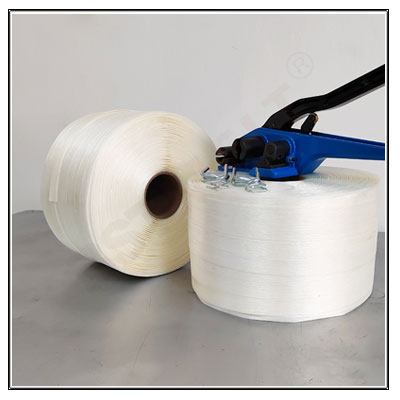In the realms of recycling and waste management, efficiency and reliability in securing bales are paramount. Bonded strapping, also known as banding, twine, string, or binding, has emerged as a versatile and indispensable solution for tying bales of cardboard, plastic, and other recyclables. Its growing popularity can be attributed to its superior strength, durability, and cost-effectiveness compared to traditional methods.


**What is Bonded Strapping?**
Bonded strapping is a robust material used to secure bales and bundles during storage and transportation. Unlike regular twine or string, bonded strapping is manufactured from high-tensile materials such as polyester or polypropylene. These materials are known for their exceptional strength and resistance to breaking under stress, making them ideal for securing heavy and bulky loads.
**Strength and Durability**
The primary advantage of bonded strapping over traditional binding materials is its strength and durability. When transporting bales of cardboard, plastic, or other recyclables, the integrity of the binding is crucial. Bonded strapping can withstand significant pressure and movement without fraying or snapping, ensuring that the bales remain secure throughout their journey. This reliability reduces the risk of load failure, minimizing potential losses and damages.
**Economic Advantages**
From an economic standpoint, bonded strapping offers significant benefits. While the initial cost of bonded strapping might be higher than that of traditional twine or string, its durability translates to lower long-term expenses. Recycling facilities and waste management companies find that they need to replace bonded strapping far less frequently, resulting in substantial cost savings. Additionally, the reduced risk of load failures leads to fewer instances of damaged goods, further enhancing its cost-effectiveness.
**Ease of Use**
Another notable advantage of bonded strapping is its ease of use. It can be applied quickly and efficiently using standard strapping tools and equipment. The consistent width and thickness of bonded strapping ensure a uniform application, enhancing the overall stability of the bales. This uniformity simplifies the baling process and saves valuable time. Unlike traditional twine or string, which can be prone to tangling, bonded strapping offers a hassle-free solution that streamlines operations.
**Environmental Impact**
In today’s world, where environmental sustainability is a growing concern, bonded strapping stands out as a more eco-friendly option. Many types of bonded strapping are made from recyclable materials, reducing their environmental footprint. Additionally, the durability of bonded strapping means that fewer materials end up as waste, contributing to more sustainable recycling and waste management practices.
**Industry Adoption**
The adoption of bonded strapping is on the rise across various industries, particularly in recycling and waste management. Professionals in these fields are increasingly recognizing the benefits of switching to bonded strapping. Testimonials from industry experts highlight the positive impact of using bonded strapping, including fewer load failures, reduced downtime, and significant cost savings over time. As more companies share their success stories, the momentum behind bonded strapping continues to grow.
**Conclusion**
Bonded strapping, also referred to as banding, twine, string, or binding, represents a versatile and reliable solution for tying bales of cardboard, plastic, and recyclables. Its superior strength, durability, ease of use, and environmental benefits make it an ideal choice for modern recycling and waste management practices. As industries continue to prioritize efficiency and sustainability, bonded strapping is set to play an increasingly important role in securing and transporting materials. The ongoing shift towards bonded strapping reflects a broader trend of innovation and improvement in how we manage and recycle waste, ensuring that these processes are as effective and sustainable as possible.




